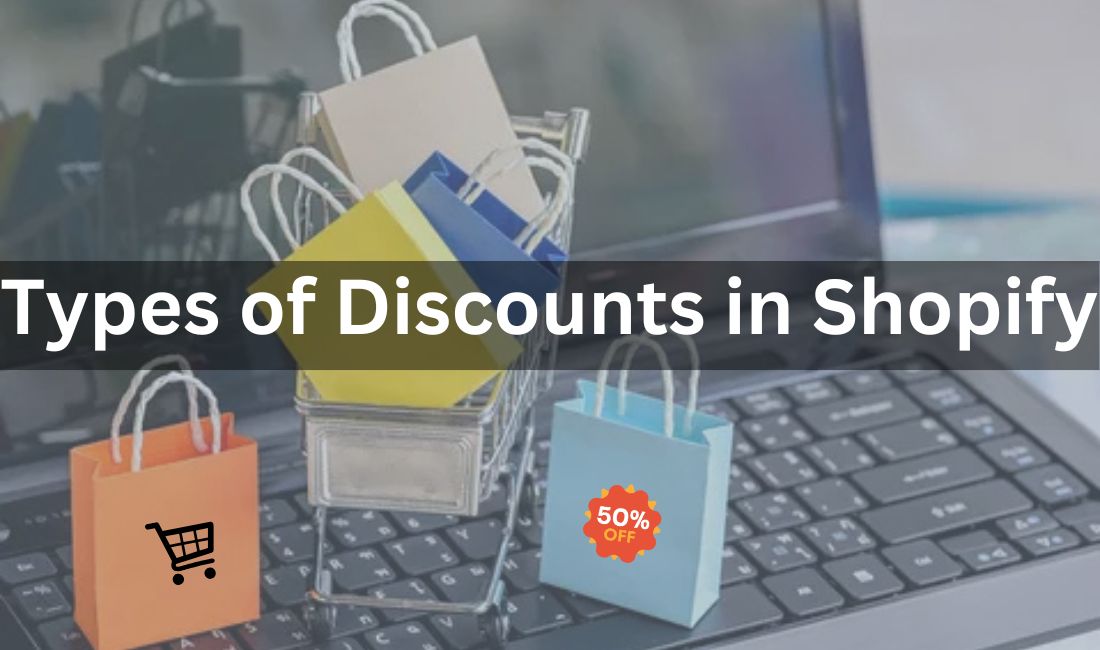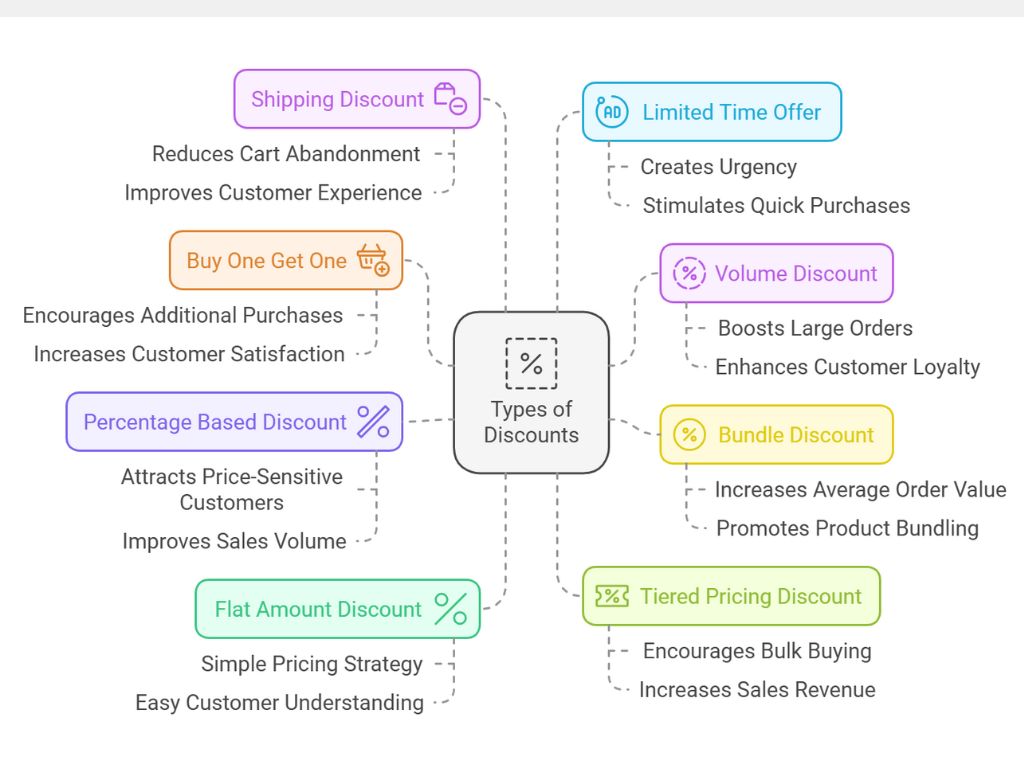
According to Medalia’s survey on the effect of inflation, only 36% are just making ends meet. So, we can’t expect them to spend a lot of money while shopping. Discounts can play a vital role in this scenario.
Discounts reduce the cost of items or services, often by a percentage or using specific criteria. For example, a shoe store may offer a 50% discount on particular product lines. Brands use discounts to shed unwanted inventory, promote new items for sale, or attract customers. eCommerce discount promotion also provides value to the customers. It is easier for them to buy products due to the lower prices.
In this blog, we’re going to discuss different types of discounts and their effects on your Shopify store.

A customer using a BOGO coupon will only pay for one item and receive two. But why will a merchant offer it? Because it can increase your profit margins and draw in new customers.
For example, “Buy one large pizza and get one pasta free.”
You can create a bundle of two/ three products and sell them at a lower price. It encourages buyers to buy more than one item. While giving the client value, this tactic can raise the average order value.
For example, “Buy a shampoo and get conditioner and hair serum for 15% off the total bundle price”.
If you’ve too many products stored in your inventory, use volume discount to clear it faster. It is a tried and tested method to move inventories quickly. You will provide discounts based on the quantity of things purchased. It’ll encourage customers to make larger purchases.
For example, “Buy 10 or more hoodies and get 25% off the total order”.
The entire purchase price is reduced by a percentage with these discounts. They are well-liked by both clients and merchants because they are adaptable and simple to comprehend.
For example, you might offer 15% off sitewide during a holiday sale to attract shoppers.
Regardless of the entire order value, customers receive a certain percentage off their purchase. Because of its transparency and ease of use, this kind of discount can seem alluring.
For example, offering $5 off on the total cart amount motivates the customers to spend more to reach the discount threshold.
Tiered discounts entice customers to purchase multiple items by offering larger savings as customers spend more. What is your gain here? Your average order value (AOV) rises as a result.
For example, “Buy 2 t-shirts, get 10% off; buy 3 t-shirts, get 15% off; buy 4 t-shirts, get 20% off”.
It is applied to the shipping cost. This can be a great way to attract new customers, encourage larger orders, and improve customer satisfaction. You can offer free shipping on all orders over a certain amount or a flat rate shipping fee.
So, your discount campaign is complete. How do you understand if it’s successful or not? You need to analyze the performance. Track key metrics and understand how they impact your overall sales and customer behavior.
Use Shopify’s built-in analytics. There will be two reports – sales by discount report and sales by product report.
The key metrics you need to track are sales revenue, conversion rate, average order value (AOV), customer acquisition cost, customer lifetime value, etc.
You also need to analyze customer behavior. Determine if the discount attracted new customers or incentivized existing customers to purchase more. Analyze which products were most popular during the discount period. Identify customer segments that responded best to the discount.
Experiment with different discount strategies to determine the most effective approach. For example, test different discount amounts, durations, or target audiences. Analyze the results of your A/B tests to identify the best-performing strategies.
Monitor sales and customer behavior after the discount period to assess any lasting effects. Use the insights gained from your analysis to optimize future discount campaigns.
Offer various types of discounts when you’re about to launch a new product line. It’ll incentivize customers to try the product. It’ll also increase the initial sale momentum. You can gather more feedback.
Utilizing holidays, special events, and seasonal trends is a great way to attract more customers. Offer discounts that align with these occasions. For example, you can provide discounts on gift items for the holiday season.
Discounts are another great opportunity to clear out excess inventory or discontinued products. It will help you to free up space for new items. You don’t have to deal with deadstock, which can tie up capital.
Loyal consumers are among the most precious assets. They are also necessary for recurring business. A customer loyalty program is what you need. Give them first dibs on sales or special discounts as a reward. This makes people feel valued. Building loyalty is the goal of these programs. When done correctly, it pays off.
Do most of your customers leave after adding items to their cart? Then you’re not the only one! A lot of store owners said at least 70% of their buyers do the same. You need a strong abandoned cart recovery strategy. Send automated emails to them offering a discount as a motivation to complete their purchase.
Every business needs new customers. You can’t just rely on the existing customers, right? Collaboration with other brands or influencers from your industry can help you expand your reach. It is also a great opportunity to attract the fans of your partner.
Promote your products through a flash sale or limited-time offer. This option is also great for clearing inventory. You can put discounts on orders, products, or shipping.
Shopify offers many discount applications. These apps automate the process of applying discounts to customer orders. They can significantly streamline your store’s operations and improve customer experience.
Using the automatic discount app in your Shopify store can streamline your different types of discount strategies.
A discount app lets you apply discounts automatically. It will save you valuable time and effort. You can shift your focus toward other aspects of your business.
Automated discounts enhance user experience more than coupon codes. Putting codes manually can be a hassle. On the other hand, discounts being applied automatically at checkout reduces friction in the buying process.
Want your shoppers to buy more items? Offer tiered discounts based on order value to incentivize customers. They’ll add more products to their cart to reach the discount threshold. It’ll ultimately increase their average order value.
Customer behavior is an important criterion of a discount campaign. You can create specific discount rules, and B2B sales incentives based on customer behavior. Suppose, first-time buyers, loyal customers, or customers who have abandoned their carts will receive discounts. This approach will maximize the campaign’s effectiveness.
Every business is different. So are their need, goals, and target audience. So, customize discount rules and parameters to align with business goals and audiences. The app provides flexibility to tailor the campaigns accordingly.
There are three types of discounts in Shopify. But you can decide what your store needs. You can choose product discounts, order discounts, or shipping discounts. You also can combine the Shopify discounts. Do industry and competitor research to understand what your business needs to flourish. Use Shopify’s built-in option to create discounts. Or, you can use a discount app to create it. The process will be easy and smooth.
As the name suggests, when you offer automatic discounts, they will apply automatically at checkout and on the cart. Amount off, free shipping, Buy X get Y, etc all can be automatic discounts. You can set a minimum amount to purchase.
The most common types of discounts are BOGO (buy one get one), free shipping, percentage-based discounts, etc. You can offer discounts as you like.
There are five types of discount combinations:
Order discounts with free shipping discounts.
Product discounts with free shipping discounts.
Product discounts with other product discounts.
Product discounts with order discounts. (only available to eligible merchants)
Order discounts with other order discounts. (only available to eligible merchants)